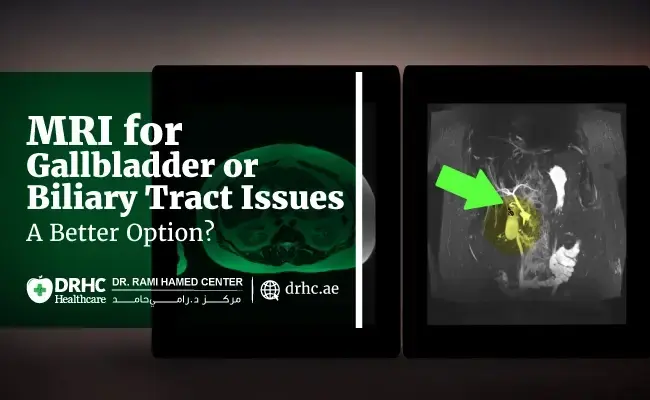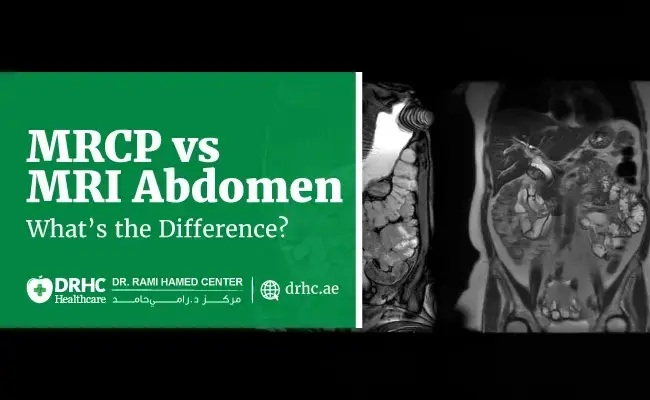
If your doctor has recommended a medical imaging test—either an MRI or a CT scan—you may feel a bit overwhelmed. It’s natural to wonder: What’s the difference? Is one better than the other? Will it be painful or dangerous?
At Dr. Rami Hamed Center (DRHC) in Dubai, we understand that facing any kind of scan or test can feel intimidating. That’s why we believe in educating and empowering patients to make informed choices. MRI and CT scans are both powerful diagnostic tools—but they’re used for different reasons.
Let’s break it down in simple, clear terms so you can understand which scan might be right for you—and why.
MRI and CT Scan: What’s the Basic Difference?
While both MRI (Magnetic Resonance Imaging) and CT (Computed Tomography) scans provide detailed images of your body’s internal structures, they work in very different ways:
- MRI uses magnetic fields and radio waves—no radiation. It produces highly detailed images, especially of soft tissues like the brain, muscles, nerves, ligaments, and internal organs.
- CT scan uses X-rays to create fast, detailed images—especially useful for viewing bones, blood vessels, and lungs, or in emergency situations.
Both are non-invasive and safe when used appropriately. The choice depends on the specific condition being investigated.
When Is an MRI Recommended?
An MRI is often the preferred scan when your doctor needs a closer look at soft tissues. You may be referred for an MRI if you're experiencing:
- Unexplained back pain or joint issues
- Brain or spinal cord concerns
- Muscle or ligament injuries
- Tumors or cysts in soft tissue organs (e.g., liver, kidney, uterus)
- Detailed imaging for neurological or orthopedic conditions
MRI scans take longer than CTs (30–60 minutes), but they are radiation-free and offer superior detail for many soft tissue evaluations.
- A head injury or stroke symptoms
- Suspected lung problems, such as pneumonia or a pulmonary embolism
- Fractures or bone damage
- Abdominal pain to check for appendicitis, kidney stones, or internal bleeding
- Need for urgent imaging in emergency settings
A CT scan usually takes just a few minutes, making it the preferred choice in urgent care scenarios.
Are These Scans Safe?
Yes—both MRI and CT scans are considered safe, but each comes with different considerations:
- MRI is safer for pregnant women and children, since it doesn’t use ionizing radiation. However, people with certain metal implants or pacemakers may not be eligible.
- CT scans do involve low doses of radiation, which are generally safe but used with caution, especially in children or with repeated exposure.
At DRHC Dubai, all imaging procedures are performed following strict international safety protocols, and your doctor will only recommend what is medically necessary for your condition.
What to Expect During the Scan
MRI Experience:
- You’ll lie on a table that moves into a tunnel-like machine.
- It can be a bit noisy, and you’ll need to lie still for up to an hour.
- No pain involved, though you may feel anxious if you’re claustrophobic.
CT Scan Experience:
- It’s a fast and open process, usually completed in a few minutes.
- You may be asked to hold your breath briefly during the scan.
- Sometimes contrast dye is injected for clearer images—generally safe and well-tolerated
Both scans are painless, and there’s no recovery time needed afterward.
MRI vs CT: A Quick Comparison Table
| Feature | MRI | CT Scan |
|---|---|---|
| Technology | Magnetic fields & radio waves | X-rays (radiation) |
| Best for | Soft tissues, brain, spine, joints | Bones, lungs, abdomen, and emergencies |
| Scan time | 30–60 minutes | 5–10 minutes |
| Radiation exposure | None | Low dose |
| Claustrophobia concerns | More likely | Less likely |
| Use with implants | Not always safe | Usually safe |
| Emergency use | Less common | Very common |
Explore Our Related Blogs
- IBD or Crohn’s? Why MRI is Better than Colonoscopy Alone
- Non-invasive Imaging for Small Bowel Tumors
- MRCP vs MRI Abdomen – What’s the Difference?
- MRI for Gallbladder or Biliary Tract Issues – A Better Option?
FAQs: Common Questions About MRI and CT Scans
1. Which scan is more accurate?
It depends on what you're trying to diagnose. MRI is more accurate for soft tissues, while CT is more accurate for bones and urgent evaluations.
2. Is one scan more expensive than the other?
MRI scans tend to be more expensive due to the technology and scan time involved. However, your doctor will recommend the most effective scan, not the most expensive one.
3. Are contrast dyes safe?
Yes. Contrast dyes used in MRI (gadolinium-based) and CT (iodine-based) are generally safe. Let your care team know if you have kidney problems or allergies.
4. Can I eat before the scan?
In most cases, yes. But if contrast dye is needed, you might be asked to fast for a few hours. Our team at DRHC will give you clear instructions before your appointment.
5. Will I feel anything during the scan?
No. Both MRI and CT scans are completely painless. You might hear noises during MRI or feel warm during a contrast injection, but nothing painful.
6. How soon will I get the results?
At DRHC Dubai, radiology reports are typically available within 24–48 hours, and your referring doctor will explain the findings in detail.
When in Doubt, Ask the Experts
Choosing between an MRI and a CT scan doesn’t have to be confusing. Your doctor considers many factors, including your symptoms, age, medical history, and urgency, to determine the most appropriate test.
At Dr. Rami Hamed Center (DRHC) in Dubai, our radiology team uses state-of-the-art equipment and individualized care protocols to ensure every scan is safe, accurate, and as comfortable as possible.
Final Thoughts: The Right Scan Leads to the Right Diagnosis
Both MRI and CT scans play crucial roles in modern medical care. They’re not competing technologies—they’re complementary tools, and each has its strengths. Understanding the differences can help reduce anxiety and prepare you for what’s next.
If you're unsure which scan is right for you, we’re here to help. Book a consultation at DRHC Dubai to discuss your symptoms, and we’ll guide you through the best imaging option for your condition—so you can move forward with confidence and clarity.
Need an MRI or CT scan in Dubai?
Get expert guidance and advanced imaging care at Dr. Rami Hamed Center. Your health deserves nothing less than clarity.
📞 +971 4 279 8800
🌐 www.drhc.ae
📍 Dubai Healthcare City, Building 52








Leave a comment